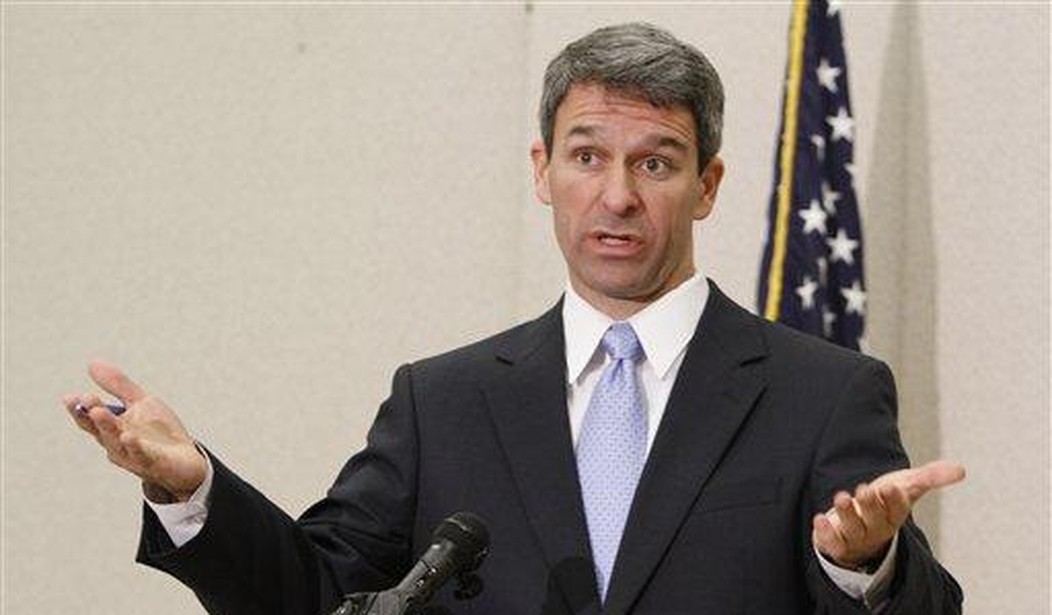The left-wing media is having a field day distorting acting U.S. Citizenship and Immigration Services Director Ken Cuccinelli's comments regarding the famous poem emblazoned on the base of the State of Liberty.
Discussing the Trump administration's new "public charge" rule, an NPR host asked Cuccinelli if the poem's words "give me your tired, your poor" are also part of the American ethos.
"They certainly are," said Cuccinelli. "Give me your tired and your poor who can stand on their own two feet and will not become a public charge."
The new "public charge" rule will expand the government's latitude to reject permanent resident status -- green cards -- to immigrants seeking government aid, such as foods stamps, housing and Medicaid.
Those media hosts pouncing on Cuccinelli show little interest in the crowning phrase of the poem, "yearning to breathe free."
CNN's Erin Burnett cherry-picked words from the poem: "wretched ... poor ... refuse."
"That's what the poem says America is supposed to stand for," charged Burnett.
Maybe that's what America is about to a left-wing CNN host. But to me and tens of millions of Americans, America is about "yearning to breathe free."
Cuccinelli explained to Burnett, who ignored him, that the first immigration law excluding those who would likely become a public charge was passed in 1882, the year before Emma Lazarus wrote "The New Colossus."
Immigration is just part of the larger discussion dividing us so deeply today. Is "freedom" what primarily defines our nation, or is it welfare and redistribution of income?
Recommended
And if it's "freedom," what does this mean?
Here is the great free market economist and Nobel laureate Milton Friedman: "Why is it that free immigration was a good thing before 1914" -- according to popular opinion -- "and free immigration is a bad thing today? ... Because it is one thing to have free immigration to jobs. It is another thing to have free immigration to welfare. And you cannot have both."
"If you have a welfare state," continues Friedman, "in which every ... resident is promised some minimal level of income ... whether he works or not, produces it or not, well, then it really is an impossible thing" to have free immigration.
In 1900, three years before Emma Lazarus' poem was posted on the Statue of Liberty, 2.8% of the nation's gross domestic product was taken by the federal government. Today it is 23.2%, almost one quarter of our nation's economy taken and largely redistributed by the federal government.
Those immigrating to the United States in 1903, when "The New Colossus" appeared on the State of Liberty, were the "tired ... poor ... huddled masses yearning to breathe free." What America offered them was freedom, work, opportunity.
They came, learned the language, became part of the country and its culture, and participated in building the great and prosperous nation that America was to become in the 20th century.
It's not to say that many who aspire to come to America today are not motivated by these things. But because welfare is so available now, in contrast to 1903, we must be careful. Not only is it costly to us but, despite the claims of progressives, rarely is it compassionate. I know from personal experience we should be offering those escaping oppression a free life, not more government.
It is simple prudence to make sure that new arrivals to the country become producers and taxpayers rather than consumers of government benefits. The Congressional Budget Office has just sounded its latest alarm that the national debt burden is headed to "unprecedented levels," posing "substantial risks" to the nation.
I wish these media hosts trying to get such mileage from "The New Colossus" were equally anxious to look for faithfulness to other songs and poems that are part of our national culture.
Songs like the one composed in 1918 by Jewish immigrant Irving Berlin, with the words:
"God Bless America,
"Land that I love.
"Stand beside her,
"And guide her,
"Through the night with a light from above."
Star Parker is an author and president of CURE, Center for Urban Renewal and Education.
























Join the conversation as a VIP Member